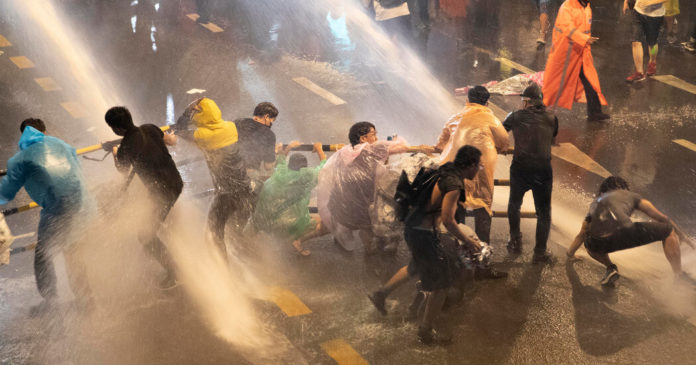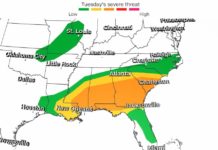BANGKOK — As antigovernment protests in Thailand have escalated in recent days, the authorities have responded with an arsenal of threats, diktats and detentions. On Friday, they sprayed demonstrators with water cannons and sent rows of riot police officers at them, forcing a retreat. More than 20 protest leaders have been arrested.
And two of them were charged on Friday with an obscure infraction that could result in life imprisonment: committing “an act of violence against the queen’s liberty.”
The “act of violence” was, apparently, yelling at a royal motorcade.
Two days earlier, a stretch Rolls-Royce carrying Queen Suthida Vajiralongkorn Na Ayudhya and Prince Dipangkorn Rasmijoti, the heir apparent, had made a surprise detour past some of the protesters, who have been calling for fresh elections and reforms to the monarchy for months.
“Oh, the royal motorcade,” said Aekachai Hongkangwan, a veteran political activist, throwing his hand up in the defiant three-fingered salute that the protesters have borrowed from “The Hunger Games.”
“Stay in line and keep the peace,” added Bunkueanun Paothong, a college student, through a megaphone.
That was it. Both accounts were confirmed by eyewitnesses and video footage. But by Friday, both Mr. Aekachai and Mr. Bunkueanun had been charged with violating Section 110 of Thailand’s criminal code — a provision so arcane that a database of Thai Supreme Court cases makes no mention of it.
With an army-drafted Constitution and some legal provisions that hark back to when the country was an absolute monarchy, Thailand has plenty of draconian offenses that can land people in jail for speaking out. A lèse-majesté law criminalizes criticism of the royal family and can mean prison sentences of up to 15 years. (Mr. Aekachai once served two years in prison for insulting the crown.) Sedition and computer crime acts have been used to incarcerate others.
The use of Section 110, however, was unexpected. Human rights lawyers and legal scholars were left scrambling to understand what exactly constituted an “act of violence against the queen’s liberty.” Punishment for the crime, which also applies to acts against the heir apparent, ranges from 16 years to life in prison.
“When I was a student, the lecturer didn’t teach this and just skipped this law,” said Piyabutr Saengkanokkul, an opposition politician and former law professor.
On Friday, the police searched the offices of Mr. Piyabutr’s political movement, under a new emergency decree that the government announced on Thursday morning. It bans gatherings of five or more people in Bangkok and allows the police to declare any place off-limits to protesters. The demonstrators can be held without charge for up to 30 days, without access to lawyers or relatives.
“Don’t be reckless because everyone can die today or tomorrow,” Prime Minister Prayuth Chan-ocha said during a news conference on Friday, in what was seen as a warning to stop the rallies. “Don’t challenge the grim reaper.”
The protesters ignored Mr. Prayuth’s advice. On Friday afternoon, thousands of them, mostly student-aged, gathered again amid a steady rain, just as they had the day before in defiance of the emergency decree.
On Friday evening, hundreds of riot police officers charged toward the protesters and used water cannons against them for the first time. They gushed a stinging blue liquid, compelling the demonstrators to pull back.
With a smaller contingent remaining, protest leaders called an end to the rally, saying that a retreat did not signify defeat. The police said that seven people had been arrested and that there had been injuries among both the security forces and civilians. The emergency decree was extended to Nov. 13.
The appearance of the royal motorcade on Wednesday was a shock for the protesters, who had never expected to be in such proximity to the queen and the prince. King Maha Vajiralongkorn Bodindradebayavarangkun, the queen and the heir apparent spend most of the year in Germany and rarely return to Thailand. (The queen is the king’s fourth wife, and the prince is the son of his third wife; the king also has a noble consort, akin to an official mistress.)
Criticism of the royal family’s elevated status in Thailand has been taboo for decades, but the student-led protest movement has shattered this convention.
“The goal is to change the whole political system, including the monarchy and the prime minister,” said Napassorn Saenduean, a political science student at Chulalongkorn University in Bangkok, who watched the royal motorcade glide past on Wednesday. It was the first time that members of the royal family had gotten an extended up-close look at these discontented subjects.
Mr. Prayuth, a retired general, became prime minister in 2014, after leading an army coup that was justified, in part, as necessary to protect the monarchy. Thailand’s royal family is among the world’s richest, and King Maha Vajiralongkorn has extended his authority over military units and palace assets.
On Friday, a speech given by the king the day before was made public, in which the 68-year-old monarch underlined the role of the crown in Thailand.
“Now it is understood that the country needs people who love the country and love the monarchy,” he said.
The protests have drawn thousands of high-school and college students, who are chronicling their political awakening on social media, even as their parents worry about a violent crackdown. Dozens of people were killed when a protest movement was cleared from the streets in 2010, the most recent bout in a country accustomed to deadly political violence.
“Every one of us wants a country that belongs to the people,” said Nattarika Donhongpai, a high school student who attended the rally on Thursday evening in her school uniform. “We want everyone to come out and use their rights and voices to express everything.”
Ryn Jirenuwat and Muktita Suhartono contributed reporting.
Source : Nytimes













